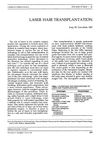 112 citations,
October 2005 in “Mayo Clinic Proceedings”
112 citations,
October 2005 in “Mayo Clinic Proceedings” Minoxidil and finasteride can slow hair loss and stimulate regrowth, but won't restore all lost hair or reverse complete baldness.
 69 citations,
September 1991 in “Journal of Surgical Research”
69 citations,
September 1991 in “Journal of Surgical Research” Understanding how fetal wounds heal could help improve healing in adults.
 57 citations,
December 2018 in “JAMA Surgery”
57 citations,
December 2018 in “JAMA Surgery” Hormone treatment for transgender patients may not need to be stopped before surgery, but more research is needed, especially on estrogen.
 47 citations,
June 2011 in “Movement Disorders”
47 citations,
June 2011 in “Movement Disorders” The LRRK2-G2019S mutation in Parkinson's disease has a lifetime penetrance of 25-35%, and finasteride may help reduce symptoms in adult male Tourette syndrome patients.
 46 citations,
September 2011 in “Movement Disorders”
46 citations,
September 2011 in “Movement Disorders” Finasteride reduces Tourette syndrome symptoms, but results may be limited due to potential biases.
 41 citations,
June 2010 in “Clinics in Dermatology”
41 citations,
June 2010 in “Clinics in Dermatology” Smoking harms skin health, causing slower wound healing, more wrinkles, and worsening some skin conditions, but may protect against certain others.
 40 citations,
December 1980 in “The Journal of Dermatologic Surgery and Oncology”
40 citations,
December 1980 in “The Journal of Dermatologic Surgery and Oncology” An improved scalp reduction technique reduces the need for hair grafts and has minimal complications.
 39 citations,
March 2019 in “Dermatologic Surgery”
39 citations,
March 2019 in “Dermatologic Surgery” PRP therapy increases hair density for androgenetic alopecia.
 39 citations,
May 2011 in “Movement Disorders”
39 citations,
May 2011 in “Movement Disorders” Finasteride may help reduce symptoms in male Tourette syndrome patients.
 36 citations,
January 2018 in “Burns & Trauma”
36 citations,
January 2018 in “Burns & Trauma” NSAIDs may not affect soft tissue healing but should be used carefully for bone fractures and more research is needed to understand sex differences in response.
 31 citations,
July 2015 in “Clinical, Cosmetic and Investigational Dermatology”
31 citations,
July 2015 in “Clinical, Cosmetic and Investigational Dermatology” Hair restoration surgery effectively treats hair loss with natural-looking results, using techniques like stem cells and platelet-rich plasma.
 31 citations,
June 2011 in “Movement Disorders”
31 citations,
June 2011 in “Movement Disorders” The document describes a woman with familial Parkinson's disease due to a genetic mutation, showing severe symptoms and poor response to treatment, and suggests finasteride may help reduce symptoms in Tourette syndrome.
 30 citations,
July 2017 in “Stem cells and cloning”
30 citations,
July 2017 in “Stem cells and cloning” SVF-enhanced adipose transplantation shows potential as a hair loss treatment.
 22 citations,
January 2014 in “International Journal of Trichology”
22 citations,
January 2014 in “International Journal of Trichology” Hair restoration surgery can lead to swelling, infections, scarring, numbness, hiccups, and poor hair growth.
 22 citations,
December 1998 in “Dermatologic Surgery”
22 citations,
December 1998 in “Dermatologic Surgery” A new storage solution may increase hair transplant graft survival.
 17 citations,
May 2013 in “Oral and Maxillofacial Surgery Clinics of North America”
17 citations,
May 2013 in “Oral and Maxillofacial Surgery Clinics of North America” The document concludes that careful surgical methods and choosing the right materials are key for successful scalp, skull, and frontal sinus reconstruction.
 17 citations,
June 2018 in “Sexual Medicine Reviews”
17 citations,
June 2018 in “Sexual Medicine Reviews” The document concludes that non-operative treatment for gender dysphoria is safe and effective, and hormone therapy does not increase cancer risk.
 17 citations,
May 2011 in “Movement Disorders”
17 citations,
May 2011 in “Movement Disorders” Finasteride significantly reduced tics and obsessive-compulsive symptoms in patients with Tourette syndrome.
 14 citations,
July 2009 in “Current Opinion in Otolaryngology & Head and Neck Surgery”
14 citations,
July 2009 in “Current Opinion in Otolaryngology & Head and Neck Surgery” Hair restoration techniques like follicular unit transplant surgery and follicular unit extraction are effective, with ideal graft placement density between 20-30 units per cm². Medications like Minoxidil and Finasteride can help maintain and regrow hair.
 11 citations,
July 2010 in “Dermatologic Surgery”
11 citations,
July 2010 in “Dermatologic Surgery” Postoperative folliculitis after hair transplants is a minor issue that doesn't relate to patient details or how much hair is transplanted.
 10 citations,
January 2007 in “Dermatologic Surgery”
10 citations,
January 2007 in “Dermatologic Surgery” Artificial hair fibers help treat scalp scars with few complications and a 20% yearly fiber fall rate.
 10 citations,
July 1997 in “Dermatologic Clinics”
10 citations,
July 1997 in “Dermatologic Clinics” Laser hair transplantation can be effective but should be limited to small areas and requires more training to ensure safety and effectiveness.
 10 citations,
June 2011 in “Movement Disorders”
10 citations,
June 2011 in “Movement Disorders” THAP1 gene changes do not affect DYT1 dystonia; finasteride may help reduce tics and OCD in Tourette syndrome.
 10 citations,
July 1981 in “Archives of Otolaryngology-head & Neck Surgery”
10 citations,
July 1981 in “Archives of Otolaryngology-head & Neck Surgery” Short scalp flaps are easier but not good for severe baldness; Juri flaps are complex but better for density and coverage.
 9 citations,
September 2012 in “Clinical Endocrinology”
9 citations,
September 2012 in “Clinical Endocrinology” More than half of patients who had acromegaly surgery experienced hair loss, with varying degrees of recovery.
 9 citations,
July 2017 in “Journal of medical case reports”
9 citations,
July 2017 in “Journal of medical case reports” Ruxolitinib treatment may cause eyelash growth.
 9 citations,
May 2012 in “Journal of Craniofacial Surgery”
9 citations,
May 2012 in “Journal of Craniofacial Surgery” Submental tissue is good for repairing mouth area skin with minimal scarring and good cosmetic results.
 8 citations,
October 2005 in “Otolaryngologic Clinics of North America”
8 citations,
October 2005 in “Otolaryngologic Clinics of North America” The document concludes that successful management of eyebrow and forehead ptosis requires a thorough approach, considering anatomy, patient evaluation, and careful selection of surgical techniques.
 8 citations,
November 2020 in “Frontiers in Cell and Developmental Biology”
8 citations,
November 2020 in “Frontiers in Cell and Developmental Biology” Certain genes are more active in baby scalp cells and can help grow hair when added to adult mouse skin cells.
 7 citations,
June 2011 in “Movement Disorders”
7 citations,
June 2011 in “Movement Disorders” A specific gene mutation is linked to a hereditary form of dystonia that responds well to certain medications.






























